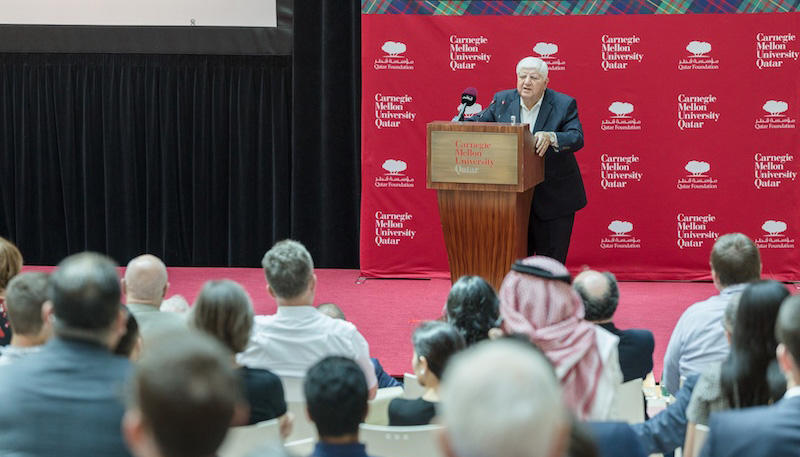Major changes on the supply and demand sides of the global Liquified Natural Gas (LNG) market require Qatar to adjust its strategy to maintain its position as the world’s leading LNG supplier, according to Dr Ibrahim Ibrahim, Economic Advisor at the Amiri Diwan.
Dr Ibrahim was speaking at Carnegie Mellon University in Qatar (CMU-Q) as a guest of the Dean’s Lecture Series. He was particularly pleased to speak to students in the audience as he said ‘it allows better understanding of issues’.
LNG policy has an enormous impact on Qatar and I am delighted to share the challenges and opportunities with young professionals who will one day make these policies themselves.’
CMU-Q Dean Michael Trick noted the value of Dr Ibrahim’s remarks. Dr Ibrahim’s perspective, according to him, will illustrate how the concepts the students are learning from school, are managed from a policy standpoint.
Supply and Demand
Dr Ibrahim said that the LNG sector faces challenges on the supply side, including the development of the shale gas industry sector in the US, the expansion of LNG supply from Australia, and the expected ascendance of the LNG positions of Russia and of some countries in Africa. On the demand side, there is expected expansion of gas consumption in large economies like China, India and Brazil.
He suggested that Qatar should adhere to the pillars of its LNG strategy to weather these challenges. These encompass a fully integrated production and delivery model, cost optimisation in the LNG delivery model, and the leveraging of the Qatargas brand, which is associated with reliability, flexibility, loyalty, and a strict compliance to contractual obligations.
He argued that, while the development of shale gas would have a negative impact on LNG prices in the short-term, the impact could be positive in the long-term, particularly for large gas suppliers such as Qatar. In other words, the development of shale gas would contribute to lengthening the duration of gas as a viable source of energy.
Qatar should also intensify the development of its gas resources, Dr Ibrahim said that the country has recently lifted the moratorium on expanding production from the North Field, and announced its intention to increase its LNG production capacity by 32 million tonnes. The announcement is expected to affect future projects from marginal suppliers, and the resulting capacity would allow Qatar to maintain its position as a leading world LNG exporter for years to come.
The Dean’s Lecture Series at CMU-Q is a forum for leaders in business and government to discuss issues that affect the future of Qatar and the world. Graduates from CMU-Q are making an impact in Qatar and around the world, including within Qatar’s LNG sector.
For more information on the Dean’s Lecture Series, and to find out more about the programmes offered at Carnegie Mellon Qatar, visit qatar.cmu.edu.





